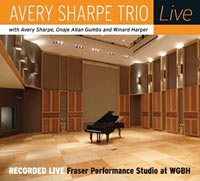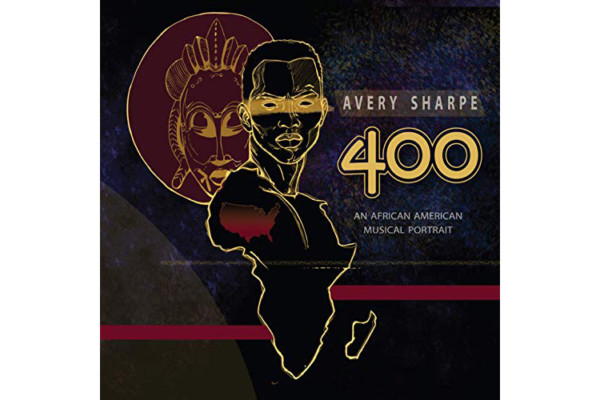A Review of Avery Sharpe Trio: Live
 There seems to have been something of a resurgence in the jazz trio recently and Avery Sharpe Trio’s Live is another soulful piano, bass, drums recording with plenty of swinging goodness.
There seems to have been something of a resurgence in the jazz trio recently and Avery Sharpe Trio’s Live is another soulful piano, bass, drums recording with plenty of swinging goodness.
Sharpe is familiar to most bassists as McCoy Tyner’s long-term sideman but since 2000, he has been focussing more on his own music. A remarkable player on both electric and double bass (he focuses exclusively on upright here), Sharpe is joined by longtime associates Onaje Allan Gumbs on piano and Winard Harper on drums.
Sharpe was raised in Georgia where his mother played piano in church. He switched from accordion to electric bass in High School enjoying gospel, rock and funk. It was while at University in Boston he met the legendary Reggie Workman who persuaded Sharpe to play upright. Within years, Sharpe was working with the likes of Art Blakey and Archie Shepp. Famously, Sharpe won a place in McCoy Tyner’s trio and stayed for around 20 years. Sharpe has released a number of records under his own name, notably Dragon Fly (2005) and Autumn Moonlight (2009). He has also been deeply involved in large scale composition on soundtracks, classical pieces and music for plays. He has a nimble, hard swinging, woody toned style infused with his love for soul and his Gospel background.
I know Onaje Allan Gumbs chiefly from his fabulous electric keyboards on one of my favorite records: Venusian Summer by Lenny White and a number of 1970s soul recordings. Gumbs, originally from the Caribbean, is a remarkable player. He has veered towards acoustic jazz after a career incorporating jazz and soul and his playing is soulful indeed. Discovered by Kenny Burrell, Gumbs played with the Thad Jones Mel Lewis band and with Nat Adderley before becoming joining Norman Connors’ production team as an arranger, pianist and keyboard player. He appeared on all of Connors’ 1970s classic soul recordings and on records by Phyllis Hyman, Roy Ayers and Angela Bofill among others. He spent two years in Woody Shaw’s band and played on Stanley Jordan’s debut record. More recently, he played on Camen Lundy’s lovely Moment to Moment.
Winard Harper is a fine drummer. He has a powerful swing but a keen sense of dynamics. He plays the kit melodically with a definite Max Roach influence and adds depth to everything he plays on. Coming to the fore in the 1980s with Dexter Gordon and Johnny Griffin, he had a long tenure in that great university of jazz: Betty Carter’s band. After The Harper Brothers, which he co-led with trumpeter Philip, he has led his own bands and played often in this one as well as with artists of the calibre of Joe Lovano, Steve Turre and Jimmy Heath.
“Blues on the Corner” opens the record, nodding to Sharpe’s lengthy association with Tyner. Bass and piano play the head in an exuberant unison with bright cymbal accents from Harper. The swinging Gumbs sounds completely at home over Sharpe’s bluesy, swinging walking – full of momentum and rhythmic variation. There’s a real sense of hearing the musicians’ joy here. Sharpe plays a fleet, fast-fingered bass solo and (as often on this record) it’s the interaction in the way that the other two support the solo that takes it to another level. Bass and piano trade fours with Harper and the drummer gives us notice that his soloing will be lyrical and melodic.
“Morning Glow” (a Gumbs composition) has a relaxed Bossa feel. Again, bass and piano voice the lyrical melody and we are reminded that this is a live album by some intonation issues in the bass. Gumbs plays some gorgeous, expansive piano over probing drums and groove-rich bass. The drums accent and echo the piano figures beautifully. Sharpe’s solo is all melodic turns and flurries of intense playing.
“Oh No!” is a slightly longer piece. It has a playful, Ornette-ish skipping theme played by bass and piano. This contrasts with a rubato section which begins with two handed exploratory piano gradually becoming more explicitly gospel themed. Gumbs has an intensity to his playing that really grabs me. The swinging bass and drums join in and Gumbs takes off into swinging intensity. Sharpe’s solo is light and playful and accompanied by scurrying piano runs and deeply grooving brushes. Sharpe runs the gamut of technique from double stops to deep slides to flamenco strumming and Harper follows with an ear-catching solo that goes from whispering snare to loud accents and rolls.
The Yusef Lateef penned “Morning” begins with beckoning repeated piano figures and enticing percussion. Bass enters with a lovely modal ostinato with a wonderful deep tone. Sharpe repeats but varies the ostinato while Gumbs solos freely and at his most Tyner-influenced and Harper commentates with songful drums. Sharpe bows a solo with unconventional intonation that recalls his passion for Reggie Workman and Jimmy Garrison’s classic modal playing. The track takes the dynamics right down and a passionate preacher-like bass melody takes the track to it’s conclusion.
What follows is Sharpe’s tour de force solo piece: “I Understand“. It’s a beautifully constructed piece that showcases Sharpe’s melodic playing, percussive tone, nimble playing, driving momentum and use of the full range of the bass. It utilizes the open A string to great effect building patterns. Starting all percussive with shifting ostinatos it also features lyrical melodic lines that I found myself singing along to. Sharpe’s sound is resonant and intense while percussive and woody and incorporates slides, slaps and intense strumming. Sharpe improvises over open string self-accompaniment with real virtuosity.
“Dragon Fly” is named for Sharpe’s days growing up in Georgia and memories of being ‘attacked’ by dragonflies. The music certainly conjures that up as Sharpe shows his abilities at atmospheric writing which he has utilized in plays and movie soundtracks. The track opens with dramatic, buzzing, insectoid arco bass and piano figures which contrast with more relaxed sections with deep, soulful groove with fabulous interaction between the trio. There is a gorgeous memorable melody which survives some approximate intonation at times, Sharpe’s bass loose limbed and liquid over swelling piano chords and pattering, chattering drumming. This has the straight 16ths feel of contemporary jazz balladry and Harper enjoys the relative freedom to create fabulous percussive soundscapes as Gumbs solos, so confident and sounding so at home – relaxed and masterful.
There is time for a sinuous drum solo from Harper over the initial buzzing rhythm as the track simmers to a conclusion
“My Favourite Things” is in seven! Mostly. The head features spare piano, ostinato bass and funky drumming. The trio make the head work well in the odd meter and develop a certain amount of energy, coiled like a spring, which is released as they break into a fast 4/4 swing release with brief, free-flowing piano and walking bass solos. Sharpe adds an inspired miniature solo of strumming, walking, ostinatos and double stops before 7/4 head returns and then piano and bass solo over the 7/4 groove.
A lovely record then of a trio who have played together for a considerable time. And a fine example of a contemporary jazz trio with a pronounced soul/gospel influence. Sharpe leaves us in no doubt that he is a gifted composer and bassist and that his trio produce heartfelt, beautiful music in a live context.
The album was recorded live in the Fraser Performance Studio at WGBH 2008, Brighton MA.
Live is available from Amazon.
Preview and download Live:


Avery is indeed the slam stewart of our generation. I have seen him twice with Mcoy and he is truly amazing. He brought the house down with an arco version of there is no greater lunch.